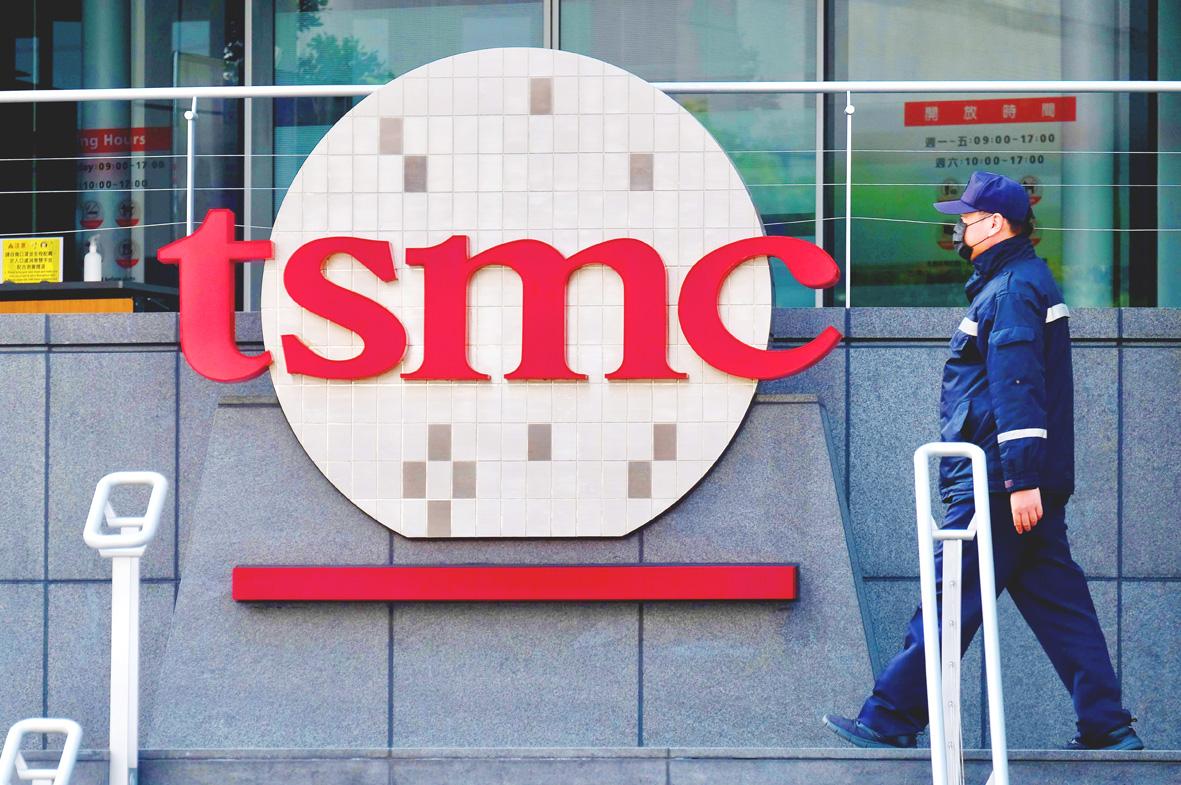Taiwan Semiconductor Manufacturing Co’s (TSMC, 台積電) largest customer accounted for 25 percent of its total revenue last year. Analysts believe the unnamed company to be Apple Inc.
The world’s largest contract chipmaker generated NT$336.78 billion (US$11.9 billion) in consolidated sales from its largest customer last year, accounting for about 25 percent of the total, financial data provided by TSMC showed.
With TSMC believed to be the sole processor supplier for Apple’s iPhone 12, analysts said the largest customer is likely the US consumer electronics giant, which drove the chipmaker’s sales growth.

Photo: Sam Yeh, AFP
TSMC did not identify the customer.
TSMC last year posted consolidated sales of NT$1.339 trillion, a historic high and up 25.17 percent from a year earlier on the back of strong global demand for smartphones, high-performance computing devices and Internet of Things products.
TSMC said that revenue generated from its largest customer rose 36.22 percent from a year earlier, meaning its sales to the customer rose from 23 percent to 25 percent of its total sales.
As Apple is keen to unveil processors it designed itself using TSMC’s high-end technologies, analysts said that the chipmaker is expected to see sales to the US customer grow.
TSMC said it last year generated consolidated sales of NT$167.39 billion from its second-largest customer, up 9.49 percent from a year earlier.
While TSMC again did not identify the customer, which accounted for 12 percent of total sales, down from 14 percent in 2019, analysts said that the company is likely Huawei Technologies Co (華為).
Due to tensions between the US and China, Washington imposed sanctions on the Chinese smartphone company on Sept. 15 last year. TSMC stopped shipments to Huawei on Sept. 14.
However, the void left by Huawei has been quickly filled by other customers, TSMC said.
Last year, TSMC generated NT$817.91 billion in sales to the US, which accounted for 61.07 percent of its total sales, making it the largest market for the company’s products.
TSMC posted sales of NT$233.78 billion, or 17.45 percent of its total sales, to China, the second-largest market, which was followed by Taiwan, where the chipmaker generated sales of NT$129.08 billion, or 9.63 percent of its total.

Taiwan will prioritize the development of silicon photonics by taking advantage of its strength in the semiconductor industry to build another shield to protect the local economy, National Development Council (NDC) Minister Paul Liu (劉鏡清) said yesterday. Speaking at a meeting of the legislature’s Economics Committee, Liu said Taiwan already has the artificial intelligence (AI) industry as a shield, after the semiconductor industry, to safeguard the country, and is looking at new unique fields to build more economic shields. While Taiwan will further strengthen its existing shields, over the longer term, the country is determined to focus on such potential segments as

UNCERTAINTY: Innolux activated a stringent supply chain management mechanism, as it did during the COVID-19 pandemic, to ensure optimal inventory levels for customers Flat-panel display makers AUO Corp (友達) and Innolux Corp (群創) yesterday said that about 12 to 20 percent of their display business is at risk of potential US tariffs and that they would relocate production or shipment destinations to mitigate the levies’ effects. US tariffs would have a direct impact of US$200 million on AUO’s revenue, company chairman Paul Peng (彭雙浪) told reporters on the sidelines of the Touch Taiwan trade show in Taipei yesterday. That would make up about 12 percent of the company’s overall revenue. To cope with the tariff uncertainty, AUO plans to allocate its production to manufacturing facilities in

COLLABORATION: Given Taiwan’s key position in global supply chains, the US firm is discussing strategies with local partners and clients to deal with global uncertainties Advanced Micro Devices Inc (AMD) yesterday said it is meeting with local ecosystem partners, including Taiwan Semiconductor Manufacturing Co (TSMC, 台積電), to discuss strategies, including long-term manufacturing, to navigate uncertainties such as US tariffs, as Taiwan occupies an important position in global supply chains. AMD chief executive officer Lisa Su (蘇姿丰) told reporters that Taiwan is an important part of the chip designer’s ecosystem and she is discussing with partners and customers in Taiwan to forge strong collaborations on different areas during this critical period. AMD has just become the first artificial-intelligence (AI) server chip customer of TSMC to utilize its advanced

Chizuko Kimura has become the first female sushi chef in the world to win a Michelin star, fulfilling a promise she made to her dying husband to continue his legacy. The 54-year-old Japanese chef regained the Michelin star her late husband, Shunei Kimura, won three years ago for their Sushi Shunei restaurant in Paris. For Shunei Kimura, the star was a dream come true. However, the joy was short-lived. He died from cancer just three months later in June 2022. He was 65. The following year, the restaurant in the heart of Montmartre lost its star rating. Chizuko Kimura insisted that the new star is still down